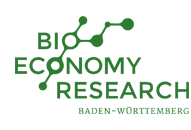Microalgae – potential for relaxing the global biomass balance through the provision of high quality nutritional proteins?
Current demand projections assume that the global consumption of animal products will rise steeply by 2050. Reasons include the growing world population, growing income and growing per capita consumption of animal products in developing and industrialized countries. In public discussion, the potential benefits of a lower consumption of animal products are playing an increasing role as it will free up resources, reduce greenhouse gas emissions, and a will positively influence human health. Vegetable protein from arable crops is therefore gaining importance, with the use of microalgae protein in human and animal nutrition being a possible future scenario.
The aim of the project is to analyze the potential of microalgae to relax the global biomass balance. Acceptance of algae-based products by consumers will be analyzed first. Second, market effects of subsequent consumption changes will be incorporated into global simulation models of the agricultural sector, as European Simulation Model (ESIM) and IMPACT.
Microalgae reactors also need space. Country-specific conversion of arable land for the hypothetical setup of photobioreactors will be takn into account in a global agricultural sector model. The subsequent effect will be simulated in an exogenously formulated abstraction of corresponding arable land with a simultaneous decline in demand for traditional protein sources (primarily animal products). The new demand for algae proteins for human and animal nutrition will be displayed as an exogenous shift in demand curves from the model.
The analysis of consumer behavior will provide indications of which products may be replaced by algae products. For animal production, replacement of classic feed proteins by algae proteins will be assumed.
| Project title | Microalgae – potential for relaxing the global biomass balance through the provision of high quality nutritional proteins? |
| Institution | University of Hohenheim, Institute of Agricultural Policy and Markets (420) |
| Research group | Prof. Dr. Harald Grethe, M.Sc. Sebastian Weickert |
